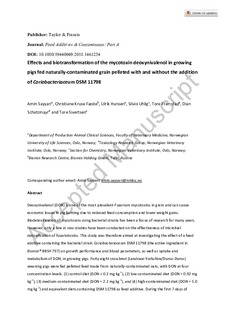| dc.contributor.author | Sayyari, Amin | |
| dc.contributor.author | Fæste, Christiane Kruse | |
| dc.contributor.author | Hansen, Ulrik | |
| dc.contributor.author | Uhlig, Silvio | |
| dc.contributor.author | Framstad, Tore | |
| dc.contributor.author | Schatzmayr, Dian | |
| dc.contributor.author | Sivertsen, Tore | |
| dc.date.accessioned | 2018-12-20T07:39:42Z | |
| dc.date.available | 2018-12-20T07:39:42Z | |
| dc.date.created | 2018-05-24T08:20:37Z | |
| dc.date.issued | 2018 | |
| dc.identifier.citation | Food Additives & Contaminants. 2018, 35 (7), 1394-1409. | nb_NO |
| dc.identifier.issn | 1944-0049 | |
| dc.identifier.uri | http://hdl.handle.net/11250/2578400 | |
| dc.description.abstract | Deoxynivalenol (DON) is one of the most prevalent Fusarium mycotoxins in grain and can cause economic losses in pig farming due to reduced feed consumption and lower weight gains. Biodetoxification of mycotoxins using bacterial strains has been a focus of research for many years. However, only a few in vivo studies have been conducted on the effectiveness of microbial detoxification of fusariotoxins. This study was therefore aimed at investigating the effect of a feed additive containing the bacterial strain Coriobacteriaceum DSM 11798 (the active ingredient in Biomin® BBSH 797) on growth performance and blood parameters, as well as uptake and metabolism of DON, in growing pigs. Forty-eight crossbred (Landrace-Yorkshire/Duroc-Duroc) weaning pigs were fed with pelleted feed made from naturally contaminated oats, with DON at four concentration levels: (1) control diet (DON < 0.2 mg kg−1), (2) low-contaminated diet (DON = 0.92 mg kg−1), (3) medium-contaminated diet (DON = 2.2 mg kg−1) and (4) high-contaminated diet (DON = 5.0 mg kg−1) and equivalent diets containing DSM 11798 as feed additive. During the first 7 days of exposure, pigs in the highest-dose group showed a 20–28% reduction in feed intake and a 24–34% reduction in weight gain compared with pigs in the control and low-dose groups. These differences were levelled out by study completion. Towards the end of the experiment, dose-dependent reductions in serum albumin, globulin and total serum protein were noted in the groups fed with DON-contaminated feed compared with the controls. The addition of DSM 11798 had no effect on the DON-related clinical effects or on the plasma concentrations of DON. The ineffectiveness of the feed additive in the present study could be a consequence of its use in pelleted feed, which might have hindered its rapid release, accessibility or detoxification efficiency in the pig’s gastrointestinal tract. | nb_NO |
| dc.language.iso | eng | nb_NO |
| dc.rights | Attribution-NonCommercial-NoDerivatives 4.0 Internasjonal | * |
| dc.rights.uri | http://creativecommons.org/licenses/by-nc-nd/4.0/deed.no | * |
| dc.title | Effects and biotransformation of the mycotoxin deoxynivalenol in growing pigs fed naturally contaminated grain pelleted with and without the addition of Coriobacteriaceum DSM 11798 | nb_NO |
| dc.type | Journal article | nb_NO |
| dc.type | Peer reviewed | nb_NO |
| dc.description.version | acceptedVersion | nb_NO |
| dc.source.pagenumber | 1394-1409 | nb_NO |
| dc.source.volume | 35 | nb_NO |
| dc.source.journal | Food Additives & Contaminants | nb_NO |
| dc.source.issue | 7 | nb_NO |
| dc.identifier.doi | 10.1080/19440049.2018.1461254 | |
| dc.identifier.cristin | 1586319 | |
| dc.relation.project | Norges forskningsråd: 225332 | nb_NO |
| cristin.unitcode | 192,16,3,0 | |
| cristin.unitname | Institutt for produksjonsdyrmedisin | |
| cristin.ispublished | true | |
| cristin.fulltext | postprint | |
| cristin.qualitycode | 1 | |

